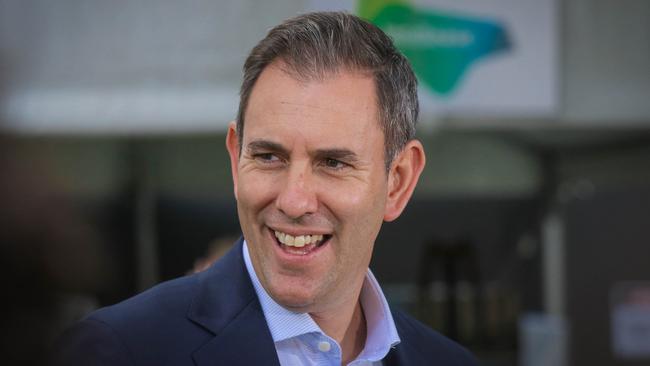
Of course there are items that matter here and there: A new super tax, some build-to-rent tax deductions, a sharp move to lift taxes on the gas industry.
But the Albanese government’s second budget is a very different exercise to its first modest venture last October. We have a budget that is in surplus which is a rarity and certainly not something that is on the horizon for comparable OECD countries such as US, UK or Canada.
A surplus sends a message that may impress the voting public but will hardly excite investors who look forwards not backwards.
But what we do have here is a playbook for the future. Long delayed welfare improvements – single parent arrangements, for example – get signed off while at the same time the wealthy are hit for revenue collections.
Here’s what you need to know.

We are heading for extended higher inflation and higher interest rates
As Treasurer Jim Chalmers repeatedly points out, inflation is the central financial concern of this period. It is also the central concern for investors.
Until very recently investors were beginning to think that interest rates locally were peaking along with inflation.
The crux of the matter is that the budget forecast – which suggests inflation will fall from 6 per cent this year and then to 3.25 per cent next year, and cosily into the RBA’s 2-3 per cent band the year after 2024-5 – is under question.
Some of the most powerful forces in global finance do not believe the forecast. Global ratings agency Standard and Poor’s openly challenged the forecasts within hours of them being released. History suggests Treasury forecasts are often wrong. As an investor it might be time to get a second opinion here.
Investors are going to need more stocks that pay rising dividends, more inflation-linked investments such as toll roads and airports and even, perhaps, inflation-linked bonds.
Mortgage holders will be screaming for tax cuts by July next year
The government continues to dance around whether it will carry through the stage three tax cuts due on July 1, 2024. Higher inflation will mean bracket creep (where pay rises push people into higher tax bands) will be red hot by July next year. Polls on the issue continue to suggest people agree with the planned tax cuts.
But it is mortgage holders who got absolutely nothing from this budget and who will be calling loudest for tax relief. Some new tax deductions for build-to-rent developers in the budget papers will be useful long term. A teeny expansion of the First Home Guarantee Scheme will have its fans too.
But the housing market, with its 1 per cent rental vacancy rates and intensifying affordability pressures, will continue. Under this scenario, rents will keep rising but the modest recovery in metropolitan property prices we have seen in recent months could cool.
A new super tax is the tip of the iceberg
The new super tax of 15 per cent on realised and unrealised gains above $3m is on its way from July 1, 2025.
So far, the government has offered no exemptions or compromises whatsoever in relation to this measure.
In the months ahead just watch the money flowing out of the top end of super into anything else to gain better tax treatment than paying an effective 30 per cent tax rate. The new 15 per cent tax over $3m combines with the existing 15 per cent tax on amounts over $1.7m to create 30 per cent. (The threshold for the 15 per cent super tax will move from $1.7m to $1.9m on July 1 this year).
It’s a dry run for more measures of this order where wealthy Australia will be targeted. The forward estimates show that the new super tax will take in $2.3bn in its first full year of receipts to the government.
So, where else might a treasurer find the ability to bring in $2bn-plus a year and face limited political heat?
Negative gearing? No.
Capital Gain Tax? No.
However, family trusts are now a sitting duck. This is what wealth managers are worried about.
Three sectors of the ASX may benefit
Targeted spending in selected areas will offer limited upside to a string of sharemarket sectors.
Analysts at Wilson put it this way: “The modest cost-of-living relief measures could provide minor second-order benefits to consumer-facing businesses such as the supermarket stocks Woolworths and Coles and low-income skewed retailers and services businesses such as Wesfarmers.
“Expanded access to the Home Guarantee Scheme provides a positive read-through to companies exposed to the housing market, including online housing classifieds providers (REA and Domain) and developers Mirvac and Stockland.”
Separately, RBC pointed to healthcare stocks Ramsay and Sonic Healthcare that would benefit from higher bulk billing funding and increased immigration.
The government will soon run out of soft targets
The targets for revenue collection inside this budget are soft by any standards. There are relatively few people in the economy today who have super worth more than $3m and there are fewer still who think that cohort should be enjoying tax concessions.
Similarly, other areas where there were cuts where few votes will be lost include tobacco and passenger taxes.
Nobody is listening any longer to tobacco tax increases. A packet of cigarettes will now cost $50! Yet, as Betashares chief economist David Bassanese points out, the danger is that revenue collection from tobacco might actually drop because the taxes are now so steep.
Hitting tobacco companies or arrivals at airports (with another $10 in taxes) is the equivalent of shooting fish in a barrel. The point here is that there are not many of these opportunities left in the market. Next year the government will have to make tougher decisions.
Red light for gas, green light for hydrogen
Throughout the budget there is a running theme of supporting the move towards renewables and clean energy. This is evident even in the nature of some government handouts where there is a reward for switching to more energy efficient equipment.
The big loser in this budget is the gas industry which is being hit for $2.4bn over four years in higher taxes. The big winner is hydrogen and the $2bn “hydrogen headstart” scheme and no doubt the vast bulk of the money will go to “green” hydrogen.
The obvious contender for this dollop of government largesse on the sharemarket is Fortescue, where founder Andrew Forrest has been making big bets on hydrogen ventures while the stock is still being priced as an iron ore major.
The irony for investors is that green investment was a loser last year while oil and coal returned money in wads. Even Treasury officials – after leaving commodity assumptions unchanged for decades – have now been forced to upgrade forecasts.
But fossil fuel investing may not always be so lucrative. The sheer volume of government money pouring into renewables suggests there will be money to be made if investors can find quality companies.







If you are searching for investor pointers inside the so-called measures in this year’s budget then you will need to dig very deep indeed.